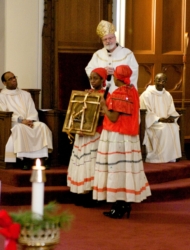Haitians mark Independence Day with cardinal
Cardinal Seán P. O’Malley celebrated Mass with members of the Haitian community at the South End’s Cathedral of the Holy Cross to mark the Feast of Mary the Mother of God and the anniversary of Haitian Independence Day.
In his homily, the cardinal recalled to the congregants that every New Year’s Haitians cajole him, “Take the soup. Take the soup.”
Joumou soup, made mostly of beef, pumpkin, cabbage and spices, is the mainstay of Haitian Independence Day parties.
During the days of French dominion, only the rulers were allowed to partake in the joumou, which gave the soup an aura of privilege and exclusivity. When independence was declared Jan. 1, 1804, Haitians made batches of the soup to enjoy as a free people. In contrast to the way the French exploited the Haitian peoples’ differences, it was shared among them as a symbol of unity and equality.
“For the Irish, ‘Take the soup’ meant the opposite thing,” the cardinal said.
During the worst days of the Irish potato famine the British would go out to where the people were starving and offer soup to them, said Cardinal O’Malley.
“The only conditions were that the people renounce the Catholic faith and the pope in Rome. The Irish preferred starvation,” he added.
The cardinal said that now that he has come to appreciate the difference, he fully enjoys his bowls of joumou, but there is no way he can eat as much of it as he is offered.
At the end of the service, four members of the Haitian youth group at Somerville’s St. Ann Parish dressed in traditional clothing and carrying an unfurled Haitian flag, approached the altar and presented the cardinal with a framed depiction of Negre Marron.
“Cardinal, thank you for your love for the Haitians. This is a symbol of our national identity,” said Neheme Jones, who was joined in front of the cardinal’s chair by Myriam Vancol and Jonathan Doclard, who carried the flag.
Father Gabriel Michel, a Haitian priest at Mattapan’s St. Angela Merici Church, said Negre Marron was the first slave to call for liberation from the French from the mountainsides. In the depiction he is shown blowing on a conch shell, the traditional communication device in the mountains.
In his Weblog, the cardinal said when he arrived in Boston five years ago, he began the custom of celebrating Jan. 1 at the cathedral with the Haitian community to mark Haitian Independence Day, as he did when he was the bishop of Palm Beach, Fla.
“The Mass was in both French and Creole, the two official languages of Haiti,” said Father Michel, who is the coordinating priest for the archdiocese’s Haitian ministry.
Haitian Creole is a blend of the French and Spanish used by the elites on the island of Hispaniola and the indigenous dialects common people brought with them from Africa--the French influence is the strongest, he said.
“The cardinal promised at his installation Mass he would learn Creole and now he is very good at it. In the beginning, he would say the ritual of the Mass in English, but used some Creole words during the service and in his homily,” he said. “Now he says the whole Mass in Creole, which he also reads very well.”
In Washington, when he was a priest leading the Haitian ministries office, the cardinal celebrated the Mass in French, Father Michel said.
There are eight parishes that celebrate the Mass in Creole, he said. In addition to St. Ann’s and St. Angela’s, they are St. Matthew Parish, Dorchester; Christ the King Parish, Brockton; St. Mary Parish, Lynn; Immaculate Conception, Everett and St. John the Evangelist, North Cambridge.
The Haitian community continues to be vibrant with strong youth groups. They have a number of young adults discerning vocations, who would be joining the two Haitian men ordained to the priesthood in 2001 and 2006, he said.



















